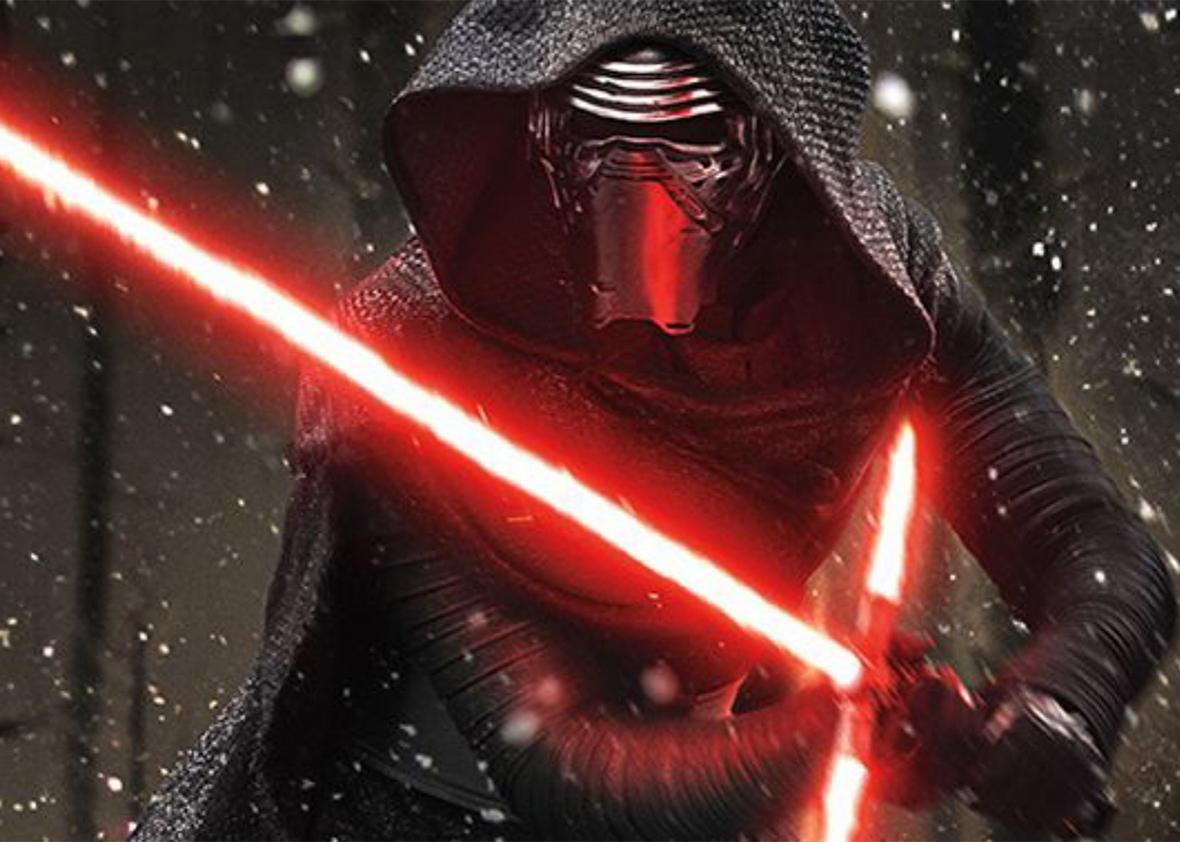I love Star Wars music. Deep in my basement lies a page of sheet music onto which I scribbled a very approximate transcription of the main theme when I was about 6. It is mounted on a cardboard rectangle, and in the margins I drew a Death Star and lightsabers. When I heard the sultry strings come in with the love theme in an early trailer for The Force Awakens, I went crazy.
The score of the new movie, which is available (but incomplete!) on streaming services, doesn’t arouse quite the same feelings in me as that trailer. But it’s beautiful in its own way—and packed with information about the plot of the film.
The new music in The Force Awakens serves two main purposes. It’s an essential part of the movie’s long, commemorative striptease, covering and uncovering the old, familiar tunes. It’s like the canvas blobs that cover the Millennium Falcon in the junkyard, R2D2 on the rebel flagship, even Luke (his cape in the flashback, his hood on the lonely island): homogeneous, mysterious, subtle. The old scores drew rousing melodies from Wagner and Korngold; the new one takes after Shostakovich and Dvorak, by turns anxious and frenzied, by turns plaintive, repetitive. When we do hear an echo of the original scores—the rising fourth of the main theme, stacked upon itself in an alien quartal configuration—it really stands out. All the old Star Wars neurons fire.
The logic of the old scores is the logic of Wagner: endless melody, theme after theme after theme, clear moral opinions about the dramatic action. The logic of the new score is the logic of twelve-tone music: math. There are exactly two new memorable themes. One is Rey’s sweeping, Slavonic folk dance (which also, admittedly, has some wizard blood running through its veins). The other is Kylo Ren’s goofy, menacing horn call. These are reiterated ceaselessly, conferring neither unambiguous praise nor unambiguous blame upon the corresponding characters, and they are closely related. At a couple key moments—like when Rey refuses Maz’s injunction to accept Luke’s lightsaber and, by extension, his quest—Williams flips Rey’s theme and sours the harmony, resulting in a new theme that sits at the exact midpoint between Rey and Kylo Ren. (You can also hear it in the full version of Rey’s theme, on the official soundtrack.)
That’s not the only time the soundtrack is used to convey moral ambivalence. When Han Solo’s ship swallows the Millennium Falcon, the soundtrack is pure fear. Han’s entrance, with a burst of old music, fails to lighten the mood. Weirder: As Kylo Ren is impaling Han Solo on his lightsaber, we hear something that sounds a lot like the bouncing, mesmeric background of Rey’s theme, but with a dark, martial twist. (For those keeping score at home, the tune that sounds next, as Solo falls through the abyss, is a riff on the “Prophecy motif” from Wagner’s Parsifal, which accompanies these words in the libretto: “The pure fool, enlightened by compassion.”) And when Rey grabs Luke’s lightsaber in the final snow battle, we hear—under the familiar “Force theme”—the melodic interval (a half-step over diminished harmonies) that usually introduces Kylo Ren’s theme.
But this time, it doesn’t. Instead, the suspicious interval opens into a concise, regal melody in the horns. (I would link to a recording, but this moment somehow didn’t make it into the official soundtrack.) It’s the “Burning Homestead theme” from A New Hope, verbatim, same orchestration, same key. This is the music that plays as Luke regards the burning skeletons of his aunt and uncle on Tatooine (wait a few seconds; you’ll hear it). As it plays in A New Hope, Luke drops his head, wounded; as it plays in The Force Awakens, Rey (if memory serves) looms, looking defiantly toward the horizon. In one sense, the meaning is obvious: Rey, like Luke, is accepting a rebel’s destiny. In another, it’s not: Luke has just experienced a formative trauma; has Rey? (Solo’s death?) And what about that feint toward Kylo Ren’s theme? It almost seems like Kylo Ren’s theme was reverse-engineered just for this moment. Through this lens, the thematic core of the score is that stately, symmetric “Burning Homestead” theme.
There’s something uncanny about this, in the same way that Rey’s flashback—the return of the repressed! a morally fuzzy Luke!—is uncanny. Wasn’t this movie about the constancy of good and evil, about reuniting with allies and facing old enemies? About remembering Star Wars? Wasn’t it nostalgic? Not according to John Williams. The Force Awakens is far more complicated: Star Wars seen through a mist of fear and uncertainty; a surprisingly unsettling meditation on our Star Wars past.
